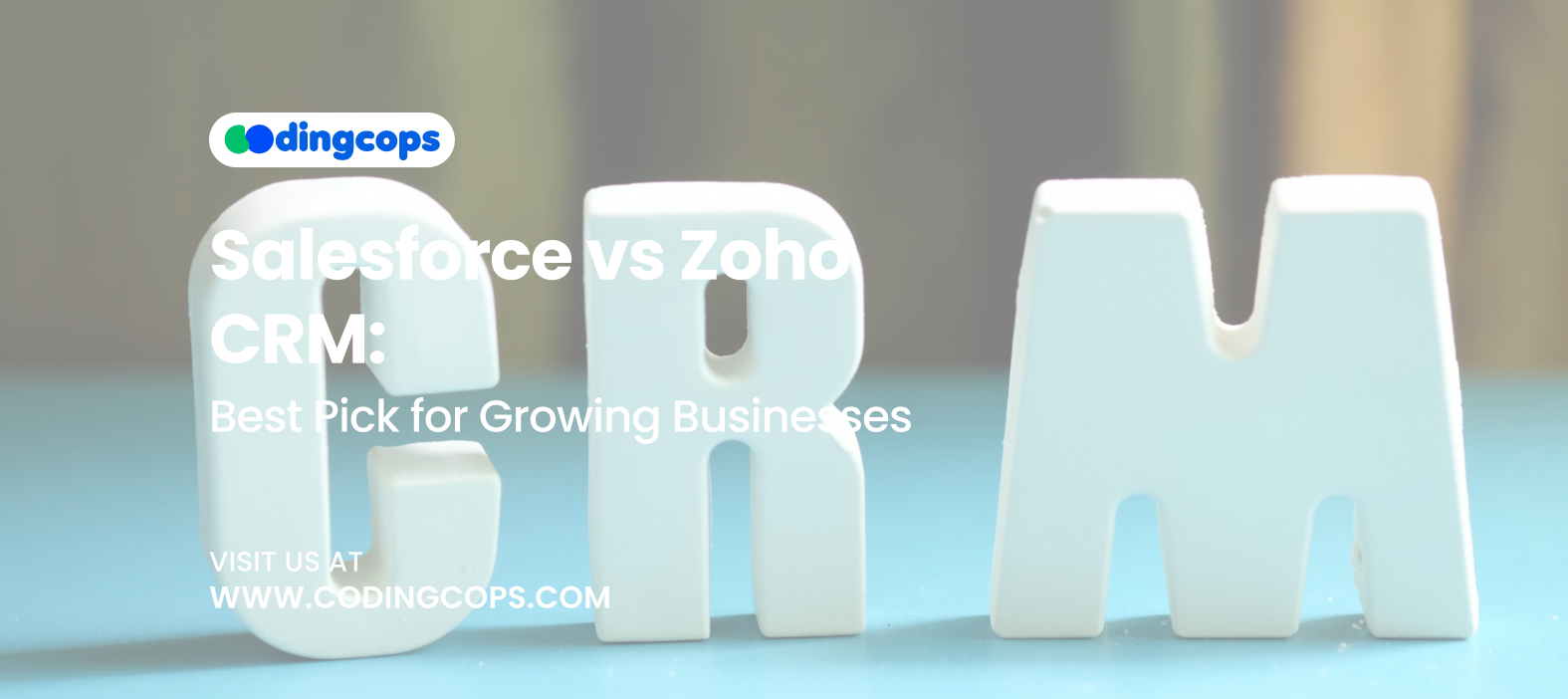Salesforce is used by 90% of Fortune 500 companies, according to statistics. Zoho CRM, on the other hand, holds a 4.5% market share. These two CRMs are the most dependable and extensively used systems. Both systems include a multitude of features that make it possible for sales and customer support teams to work efficiently.
In this guide, we’ll discuss Salesforce and Zoho CRMs. We will compare their features and security. By the end, you will have a clear understanding of which CRM suits your business goals and growth stage.
Salesforce CRM
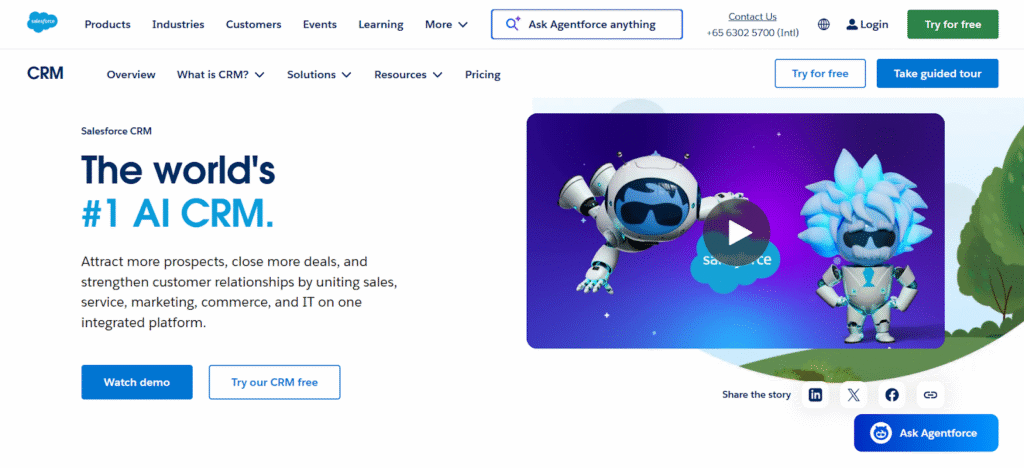
Salesforce is a platform that is designed to unify every aspect of a business under one integrated ecosystem. Moreover, it has long been the go to CRM for enterprises that require deep customization and automation.
One of Salesforce’s strongest selling points is its robust flexibility. Businesses may alter almost every aspect of the platform. Included are dashboards, data fields, automation, and workflows. Salesforce Lightning allows users to design custom apps and interfaces that fit their operations. It is therefore perfect for companies with dispersed teams or intricate sales systems.
With Einstein AI, which offers intelligent suggestions and predictive insights, Salesforce also excels in artificial intelligence. These tools enable salespeople to properly predict sales trends and select high value leads.
Moreover, Salesforce’s AppExchange marketplace is one of the largest enterprise app ecosystems in the world. It enables users to extend CRM functionality through thousands of third party integrations, from accounting tools to marketing automation systems.
But there is a learning curve associated with Salesforce’s capability. Small firms without specialized IT or administrative help may find the platform’s many capabilities intimidating. It is also more appropriate for medium-sized to large firms or companies prepared to engage in a long term CRM strategy because its pricing plan is typically more expensive than those of its competitors.
Zoho CRM
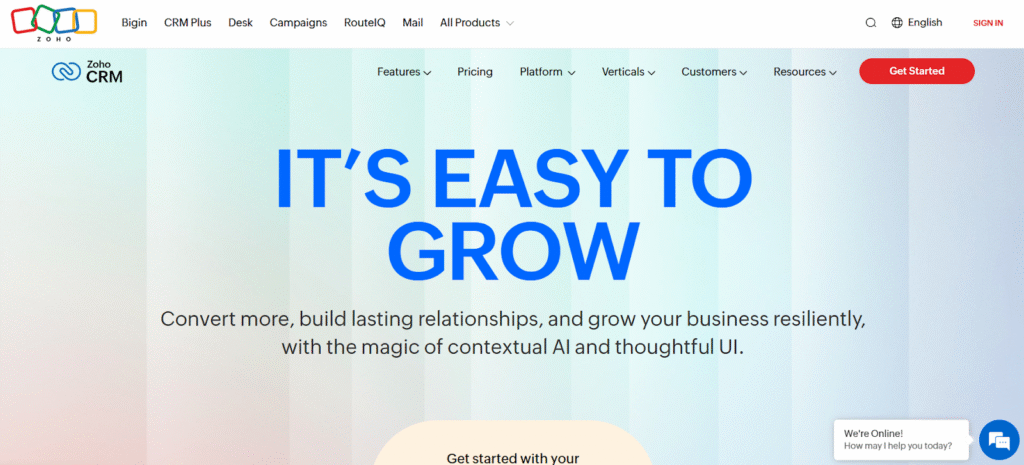
Zoho CRM is another strong rival in the CRM industry. It is renowned for providing high-quality, reasonably priced software. Zoho CRM may be useful for startups and growing companies looking for a cost effective and user friendly CRM system.
Zoho prioritizes usability and accessibility more than Salesforce, which primarily serves companies. It provides a user friendly interface that makes navigating easier. Onboarding new users will take less time as a result. Teams may rapidly begin automating common activities and managing leads even without technological experience.
One of Zoho’s biggest advantages is its seamless integration through Zia, its built in AI assistant. Zia helps businesses by analyzing sales data and providing recommendations. It’s designed to bring AI benefits to smaller businesses without the high costs associated with enterprise AI systems.
Feature Comparison of Both Salesforce and Zoho
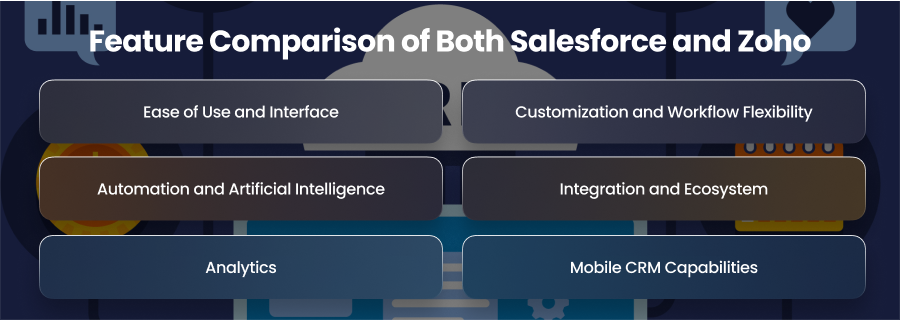
Ease of Use and Interface
For expanding companies that require rapid acceptance and little training, ease of use is sometimes a determining issue. In this sense, Zoho provides a simple, easy to use interface. The dashboard presents leads and pipeline views in an easily digestible layout, allowing users to get started with minimal setup. Key features can be used and navigated by team members who are not familiar with CRM software. Additionally, teams may remain creative without being distracted by technical details because of its drag and drop capability and simple access menus.
In contrast, Salesforce offers a much richer interface. Its Lightning Experience offers an eye-catching design full of useful features and personalization choices. However, small teams may find onboarding overwhelming due to the quantity of capabilities. As a result, a lot of businesses depend on Salesforce consultants or administrators to set up processes and dashboards to meet their unique requirements.
Customization and Workflow Flexibility
Customization is where Salesforce truly stands out. Its Lightning App Builder allows users to modify every element. Hence, companies can design custom apps and create dynamic workflows. Salesforce is hence very flexible in a variety of businesses.
For example, inside the same CRM environment, a healthcare provider can develop a custom Salesforce application that monitors patient contacts and interfaces with medical record systems.
Zoho CRM also offers strong customization features, though within a more confined structure. Users can add modules and design automated workflows. It includes Blueprint, a visual process builder that allows teams to design and enforce sales processes step by step. Despite its strength, Zoho’s customization possibilities might not be as extensive as Salesforce’s for businesses with really specific requirements.
Automation and Artificial Intelligence
Salesforce uses Einstein AI and Flow Builder to deeply integrate automation. Everything from forecasting and client engagement to lead assignment and follow-up reminders may be automated by users. By evaluating past data and making wise recommendations, Einstein AI elevates automation.
For instance, a sales team may utilize Einstein to find high-performing lead sources and even employ AI insights to create customized messaging.
Zia, the AI assistant included in Zoho CRM, aids with process automation and sales pattern analysis. Zia can also perform sentiment analysis on emails and recommend actions, like the best time to contact a prospect.
Integration and Ecosystem
A CRM doesn’t operate in isolation; its ability to integrate with other tools determines how well it supports your business ecosystem.
Salesforce is unmatched in this category. Its AppExchange marketplace hosts over 5000 third party applications covering every business function. Additionally, seamless departmental connection is made possible by Salesforce’s built in capabilities like Marketing Cloud and Commerce Cloud.
For example, companies that utilize Slack or HubSpot may integrate them directly into Salesforce processes. This integrated platform allows businesses to maintain a single source of truth across several business functions.
Within the Zoho ecosystem, Zoho CRM flourishes. For teams who currently use Zoho apps, it is an all-in-one solution because it easily interacts with Zoho Books and Zoho Campaigns. Furthermore, Zoho facilitates interfaces via Zoho Flow and APIs with well known third party programs like Google Workspace and Outlook.
Analytics
One of the most sophisticated reporting and analytics solutions in the CRM industry is offered by Salesforce. Customizable dashboards and accurate consumer data visualization are available to users. Its AI analytics enable businesses to identify performance bottlenecks and measure sales team productivity. Moreover, Salesforce’s Tableau integration brings high level business intelligence into the CRM environment. This allows companies to visualize massive datasets interactively.
Through Zoho Analytics, a business intelligence platform that easily interacts with the CRM, Zoho CRM provides a great analytics experience. Users may create pre made reports and view data in dashboards and visualizations that are simple to comprehend.
Mobile CRM Capabilities
Salesforce and Zoho CRM both offer reliable mobile applications for iOS and Android. The Salesforce Mobile App provides full functionality, including dashboards and customer data access. While on the road, sales representatives may record calls and get real time alerts.
Similarly, Zoho’s mobile app offers an intutive interface for managing leads and contacts from anywhere. The app is lightweight and responsive. Also, it’s designed for fast moving sales teams.
Customer Support and Community
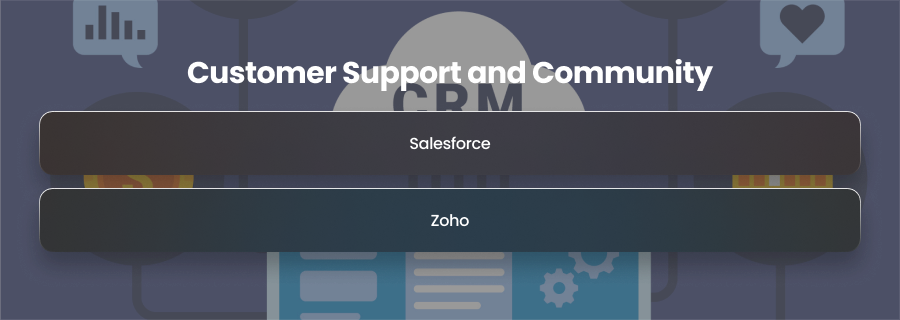
Salesforce
Salesforce is renowned for its multi tiered and enterprise grade ecosystem support. Because the platform caters to businesses of all sizes, its support structure is highly comprehensive.
At its core, Salesforce provides several levels of support plans. Each of these levels are designed to fit different business needs.
- Standard Support gives users access to online documentation and community resources.
- Premier Support offers faster response times and a dedicated success manager to ensure smooth platform adoption.
- Signature Support is the highest tier to provide a completely proactive service, with dedicated engineers who monitor performance and optimize workflows.
Apart from direct support, one of Salesforce’s greatest strengths lies in its education and self help resources. For users who want to learn more, the Salesforce Help Portal and Trailhead learning platform are priceless. Trailhead offers gamified and interactive training sessions that cover anything from advanced automation and AI integration to the fundamentals of CRM.
Moreover, Salesforce’s global community is massive, one of the largest for any business software. The Trailblazer Community, consisting of millions of users and administrators is an active hub for discussions and knowledge sharing.
Zoho
While Zoho CRM doesn’t have the same massive community scale as Salesforce, it shines in providing personalized and highly responsive customer support. Smaller companies stand to gain a great deal from this.
In its higher tier services, Zoho provides round-the-clock email and chat support, guaranteeing users can obtain help whenever they need it. All users, even those with free or basic memberships, are eligible for the Standard Support Plan. Access to email and live chat help with prompt response times is included of this package.
Zoho provides Premium and Enterprise Support services for clients that want quicker and more aggressive assistance. For complicated deployments or migrations, these include specialized technical account managers and priority answers.
Additionally, Zoho has a comprehensive knowledge base that includes troubleshooting manuals and video tutorials. Through Zoho Academy, which offers comprehensive courses covering the whole Zoho ecosystem, Zoho delivers a wealth of training resources for companies that choose self service learning.
Community wise, Zoho is steadily growing its user forums and online communities, where customers can share insights and integrations. While not as vast as Salesforce’s Trailblazer network, the Zoho community is notably active and supportive, particularly among small and medium business users.
Security and Data Management
1. Salesforce

Data Encryption
Salesforce uses AES-256 bit encryption for data at rest and TLS 1.2+ encryption for data in transit. These encryption standards are considered the gold standard for enterprise systems. Salesforce also offers fine grained access restrictions via IP whitelisting and role-based permissions. This guarantees that certain data sets may only be seen or altered by authorized individuals.
Salesforce’s Shield Platform Encryption provides an additional degree of security for bigger companies. It enables businesses to encrypt sensitive fields such as credit card details while maintaining full application functionality.
Compliance
Salesforce’s global presence requires it to comply with numerous international standards and regulations. It meets requirements for:
- GDPR
- SOC1, SOC2, and SOC3 compliance
- ISO 27001 certification
- FedRAMP and PCI DSS standards
Threat Detection
Salesforce alsi integrates real time threat detection through its Event Monitoring feature, allowing administrators to track user activity and respond to suspicious behavior quickly. The Security Health Check tool provides a score based assesment of a company’s security posture and recommends best practices to strengthen protection.
Data Backup
Salesforce maintains georeplicated data centers and automated data backups to guarantee business continuity. Data can be quickly restored with little delay in the case of a breakdown. Salesforce also offers Data Recovery Services as an add on for organizations requiring advanced recovery capabilities.
2. Zoho

User Authentication
Furthermore, Zoho uses AES 256 encryption for data at rest and TLS 1.2 for data in transit to guarantee the security of client information. It also supports multi factor authentication and single sign-on provides users with comprehensive control over who accesses their CRM environment.
Zoho’s Role Based Access Control system allows administrators to define custom user permissions based on job roles, ensuring that employees only access data relevant to their responsibilities.
Privacy and Compliance
Zoho’s commitment to data security is one of its greatest features. Unlike many SaaS providers, Zoho has a strict no advertising policy, which means that it doesn’t sell user data to other parties.
Major foreign data protection laws are complied with by Zoho CRM, including:
- GDPR
- CCPA
- SOC 2 Type II compliance
Data Backup
Every day, Zoho CRM automatically backs up data on many servers. Data loss is less likely as a result. It also offers geo redundant storage, which ensures that in the case of a server failure, data is still accessible from a different location. Zoho offers manual backup solutions for data storage for consumers who prefer greater freedom.
Activity Logs
Zoho’s Audit Log feature helps administrators track every change or update within the CRM. This visability ensures accountability and supports regulatory audits when needed. Additionally, IP tracking and session management tools help monitor unauthorized logins or suspicious activities.
Final Words
Salesforce and Zoho, each of which excels in a separate field, both offer organizations strong solutions. Salesforce is perfect for large enterprises because it delivers unparalleled scalability and enterprise grade customisation. Zoho CRM is ideal for expanding companies looking for productivity without excessive complexity or expense because of its low pricing and strong privacy emphasis.

